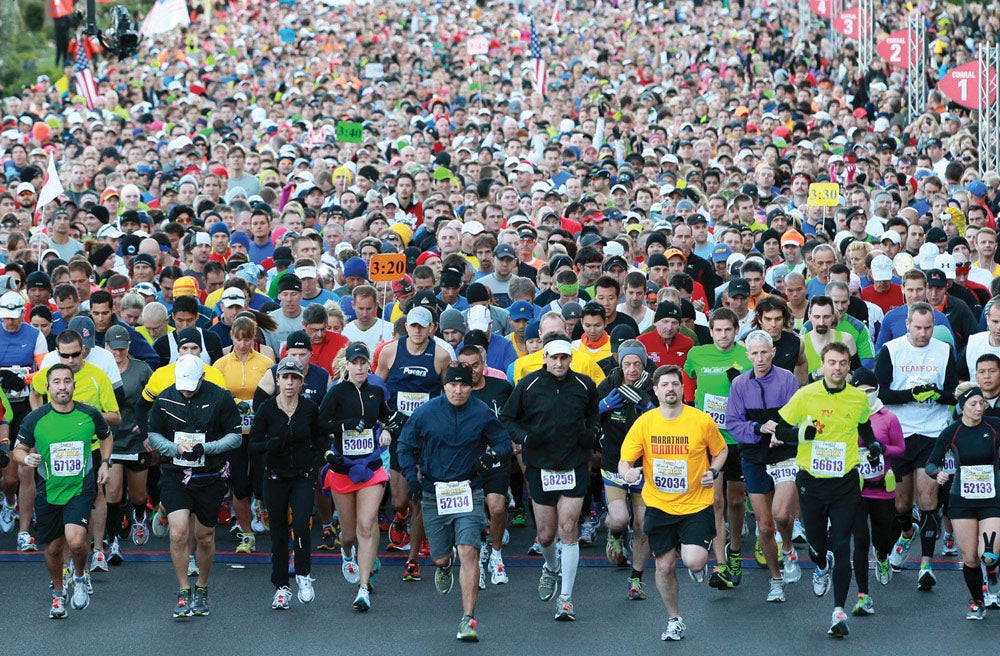Should You Run A Marathon In The Off-Season?

Photo: Victah Sailer/RnR Marathon Series
Training for a marathon can be a motivating way to get through the darker months, but given the high risk of injury and need for downtime after a full racing season, it’s not appropriate for everyone. The guidelines below will help you determine whether you should lace up your sneakers, or just relax and do some yoga.
It’s A Good Idea If …
» You have experience with continuous high-volume training.
» You’re burned out on multisport and looking for a new focus.
» You ended your season feeling healthy overall and have no history of overuse injuries.
» Your bucket list includes qualifying for Boston or running a specific marathon.
» You’re on a long-term plan for your first Ironman.
Coaches weigh in: For athletes who tend to take the off-season a little too seriously (as in park it on the couch for three months and gain 15 pounds), a marathon could be the key to staying committed. “Training for an off-season marathon can push athletes to increase run volume at a time when their focus may be wandering,” says Melissa Mantak, the 2010 USAT National Coach of the Year and owner of The Empowered Athlete.
Coach Jared Gell of Competitive Instinct Multisport says marathon training helps some of his athletes transition to run training after a season of juggling three sports. “It keeps the endurance base high, instead of sitting around until December to start preparing for that mid-summer Ironman,” he says. “Doing the run-specific block also allows for a heavy focus on the swim and bike early, and maintenance on the run through the base phases.”
RELATED: Is Your Run Improving?
It’s A Bad Idea If …
» Cycling is your weakness.
» “Off-season” isn’t a term you’re familiar with.
» You have a history of injury, especially overuse (stress fractures, IT Band Syndrome).
» You raced frequently in 2014.
» You did an Ironman within the last couple of months.
» You’re signed up for an Ironman within six months after the potential marathon race date.
Coaches weigh in: Downtime is important when you look at a complete year in triathlon training: Going hard for 12 months puts a lot of stress on the body. “Marathon training comes with the inherent risk of injury,” says coach Andrew Hood of FTP Coaching. “If the body isn’t given ample time to recover, injuries will rear their ugly heads and can derail an entire triathlon season.”
“The early-season marathon can be looked at as a battle that should be avoided in order to build up and save resources for the war ahead,” says QT2 Systems coach Jesse Kropelnicki. “Making early-season sacrifices almost always pays off later in the year.”
Quick tip: If you do a winter marathon, make sure you have two weeks of easy spinning before and a full month of recovery afterward to properly heal and prepare for your triathlon season.
Agree with the naysayers?
Run this route instead:
Race half-marathons. You can do one or two without the physical demand needed for a marathon and you’ll come out a faster and more efficient runner.
Create a different type of running challenge. Try 50 or 100 days of continuous running (even 15 minutes counts) or devote time to perfecting your form with drill work.
Concentrate on your cycling. If you’re eager for a marathon because your running feels weak, you may be wrong—it could be your bike fitness or lack of pacing know-how that keeps you from running well in triathlons.
Take a legitimate off-season. Go on weekend hiking trips or join a boot camp class. The unstructured downtime you take now will make you healthier next season.
RELATED: Improve Your Run In Between Seasons
Follow Triathlete on Twitter @Triathletemag for inspiration, new workout ideas, gear reviews from our editors and more.